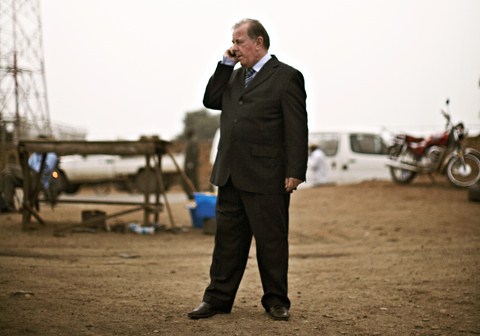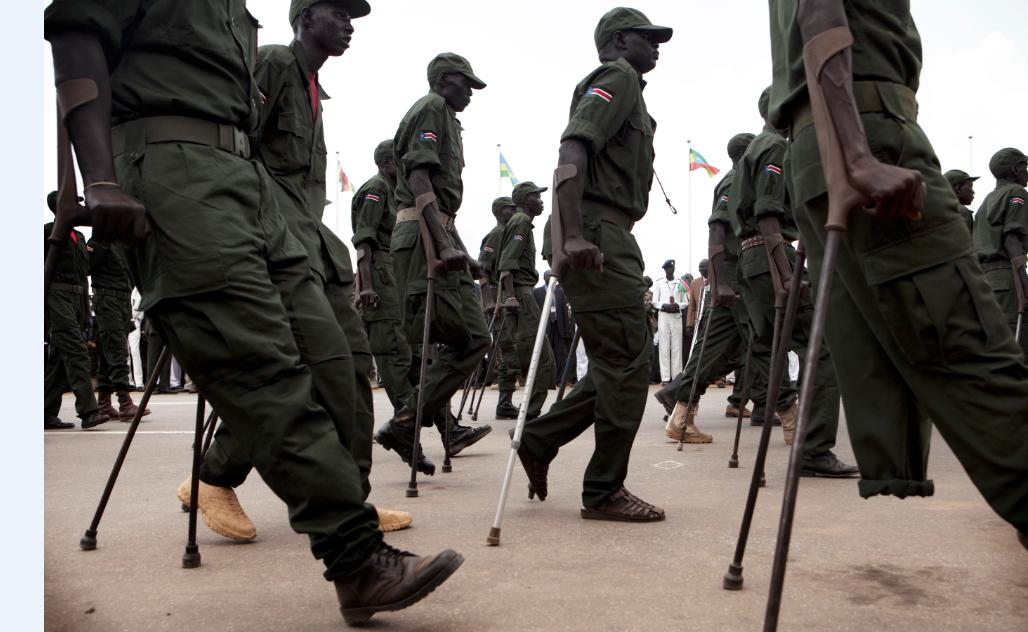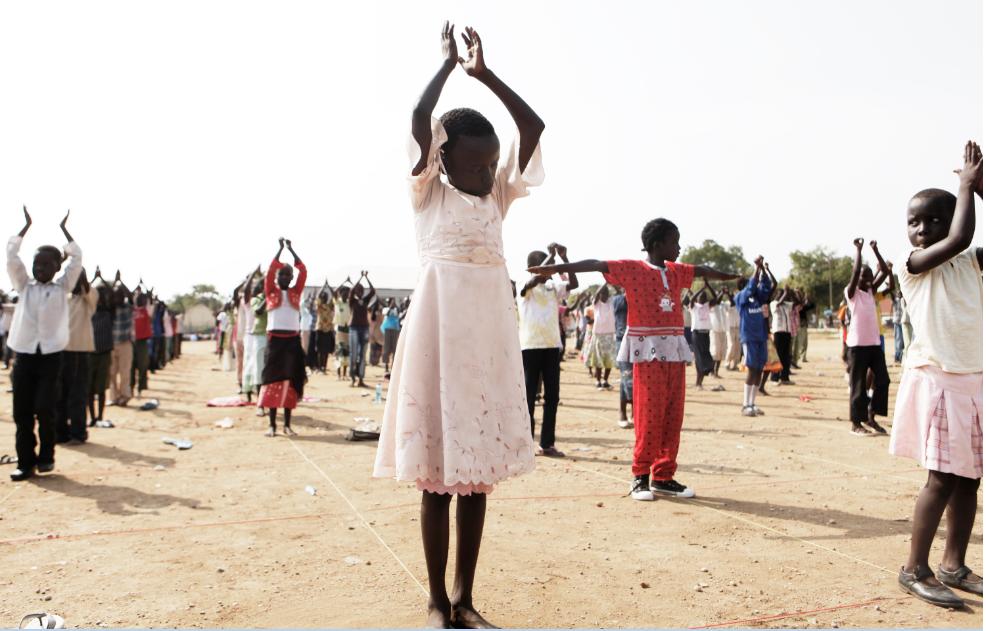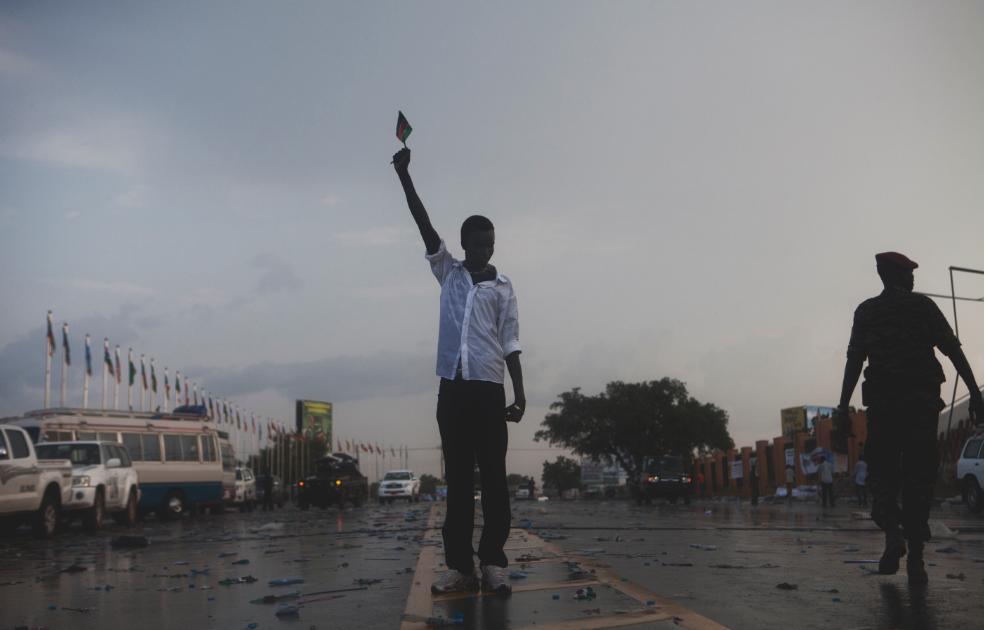Features
Published: Irish Times, 17 December 2011The rebel priest

IN THE MUDDY SLUMS OF JUBA, the people are preparing for a party. By 11pm, tens of thousands of them have poured out onto the streets: cheering, honking car horns and waving the flag of their new country, as well as those of the US, Norway and Israel.
At the stroke of midnight, South Sudan becomes the world’s 192nd independent nation. In the new capital, joy is unconfined. In the mud huts that stretch for miles in every direction, residents can be heard singing and ululating well into the night.
By 7am, the BBC World Service is reporting a crowd of a hundred thousand already gathered at the Dr. John Garang Mausoleum. The speeches here will last late into the afternoon. But despite a complete lack of respite from the sun, the people never once cease to sing, sway and chant the names of the new state, its new president and his army.
“South Sudan… oyee!”
“Salva Kiir… oyee!”
“SPLA… oyee!” After fifty years of civil war, today feels like deliverance to the people of South Sudan. Amid all of the rejoicing though, it would be easy not to notice the small, sunburnt Irishman visibly perspiring on the edge of the podium. He is neither a soldier nor a statesman. But he has done more to bring this day to pass than any other outsider. He is the rebel priest, “Commander” Dan Eiffe.
A WEEK EARLIER, on the trail of Commander Dan, I find myself perusing the modest selection of duty free Irish whiskeys on offer at Nairobi International Airport. (Well, call it a hunch.) Ringing up the purchase, the cashier is obliged to see my boarding card. “You are travelling to Juba, sir?” I admit that I am. He seems astounded. “That is a bad place,” he says. “Lots of killing.”
Technically, the cashier incorrect. Right now, a precarious peace exists in South Sudan. But for more than half a century, this vast, sweltering wilderness was the scene of one of the world’s bloodiest, most protracted and least understood conflicts. Three million civilians died in two Sudanese Civil Wars, four million were forced to flee their homes.
In 2005, a peace agreement was signed. To the surprise of most observers, the deal has held and, in January 2011, the people of South Sudan voted overwhelmingly in favour of independence.
For the old bush fighters of the SPLA, the task ahead is daunting. Home to over a hundred (often warring) tribes, South Sudan becomes one of the world’s poorest, most dysfunctional nations. More than ninety percent of the population subsists on less than $1 a day. Three quarters have no access to basic healthcare. There is no electricity, no running water and a fifteen year old girl here is more likely to die in childbirth than she is to have completed primary education.
The tropical diseases nurse in Dublin had asked if I was going to South Sudan on holiday. No, I told her. No, I am not.
JUBA AIRPORT IS BEDLAM. The largest gathering of foreign dignitaries ever assembled on east African soil will soon be traipsing through these doors. Already, a sense of nervous anticipation is palpable. At the centre of the room stands a brand new baggage scanner, into which passengers jostle to feed their suitcases. On the far side, the bags are dumped unceremoniously to the floor. Since there are two (surprisingly expensive) whiskey bottles in my bag, I elect to walk around the thing entirely. No one even notices.
The gift shop is selling loose raw eggs and salt. This is, by some distance, the most foreign place I’ve been in my entire life. Standing amid a sea of young African faces pressed against the glass outside, Dan Eiffe isn’t difficult to spot. The young recruits at the door don’t recognise him. But the airport’s chief-of security does and my visa is processed with a flick of his wrist.
“Commander Dan!” “Commander Dan!” The soldiers and politicians clamour to shake his hand. Most of them, he greets by name. Occasionally though, he comes up short. “You don’t remember me?” asks one wide-eyed army officer. “Of course, of course,” Eiffe apologises. “How is your wife?” The two exchange pleasantries and part on the warmest of terms.
It is only afterward that I realise the “Commander” still has no idea who the man was. When you’re a white, renegade Catholic priest turned gunrunner in the land of the Dinka and the Nuer, it seems, people remember you, even if you don’t remember them.

“APPROACHING A BEAUTIFUL WOMAN is like capturing an enemy village.” The young army officer is drunk. He leans across the table and grabs my arm. “First you make a reconnaissance.” He puts an imaginary spyglass to his eye. “Then you lie in wait.” He sinks his chin below table level. “Then you strike!” He leaps from his seat, upsetting our drinks and laughing so hard he almost falls off the stool.
The DaVinci is one of a dozen or so Western compounds constructed since the 2005 peace deal brought aid funds pouring into Juba. Right now, it’s getting late. But Dan is in reflective mood. He was born in Ratoath, Co. Meath, to a family of sixteen children. “The most important person in our village was the parish priest. So that’s what I wanted to be.” He laughs. “Some people want to be jet pilots. I always wanted to be a priest.”
After finishing school, he entered Maynooth as a seminarian. There he learned about the injustices of Apartheid and came under the influence of liberation theology. “I just couldn’t believe that a situation would exist where two human beings, a black person and a white person, could not sit together, could not eat together, could not love each other.”
Upon his ordination in 1977, he decided to go to South Africa where he worked as a Missionary of the Sacred Heart. A decade later, he decided upon a rather dramatic change of scene.
“When I landed in this here town of Juba in 1987,” he says, “All the NGOs were gone. I was the only white man in the place. There was one road out of town and it was closed. So this was basically an open air prison.” Eiffe found the town occupied by the Sudanese regular army, but under siege from native SPLA fighters operating in the surrounding countryside.
“I couldn’t eat the food here. Every morning I would get on my motorbike at 6am and rush to meet the morning relief plane from Nairobi. They would give me whatever they had leftover: croissants, maybe, and some jam. For five years, I didn’t eat any meat. I lived on beans. There are only so many things you can do with African beans. Believe me, I could write a book about it.”
How did this diminutive priest go from providing humanitarian aid for the victims of civil war, to taking up arms in support of one side? The 1980s were one of the bloodiest decades in the Sudanese conflict. After an eleven year lull in fighting, Arab horsemen (forerunners of the janjaweed that would pillage Darfur two decades later) had resumed attacking southern villages, killing men, raping women and taking their children as slaves.
“All the international press wanted to talk about was apartheid, apartheid, apartheid,” recalls Dan today. “Well, I’d worked in South Africa for eight years. And the worst excesses of apartheid were a tea party compared to what was happening here. This was a hundred times worse. This was genocide.”

ON THE GRASSLESS PLAYING AREA outside Juba One School, nine hundred barefoot children are being put through their paces by an unsmiling drill instructor. The children are preparing for Independence Day celebrations. We’re shooting documentary footage. There is a call from Dan. “It’s here,” he says. I flag down a passing boda-boda motorcycle taxi.
Fifteen thousand copies of The Sudan Mirror have just landed at Juba airport. The publisher celebrates with an early afternoon beer. The Kenyan journalist Aidan Hartley once wrote that “few have faced the dilemmas, seen the evil or risked death and destruction the way [Dan Eiffe] has.” Yet in person, Dan is less imposing, less adapted to his surroundings, than you might expect.
He speaks in a thick Irish accent. With a mobile phone at his ear, he is constantly barking orders at people who seem not to understand what he is saying.
Did he ever consider making a life in Ireland? “No. I was fed up of the clericalism there. If you didn’t wear your collar, or were seen talking to a girl, that was looked upon unfavourably. I thought that was ridiculous.” So his decision to become a missionary priest was motivated by anticlericalism? He flashes me a cheese and onion grun. “You could say that,” he laughs.
The Sudan Mirror is published with the support of Trocaire and other international aid agencies. When Eiffe founded it in 2003, South Sudan was taking its first tentative steps toward nationhood. “These people had never had a newspaper in this country, let alone a TV station.”
This special independence edition includes articles celebrating the triumph of the South Sudanese liberation movement. But on page nine there is a piece recalling its nadir. Nimule, in 1994, might well have proven the SPLA’s last stand. Instead it marked a turning point in the rebels’ fortunes – one that would cement the legend of “Commander Dan”.
“WELL, I WAS NEVER NEUTRAL,” he admits. “From the beginning, I was giving the rebels blankets, fuel and food. They had nothing. Our president didn’t even have a car.” Eiffe was employed by Norwegian People’s Aid, a maverick aid agency with ties to the rebels. By 1994, government advances had pushed the SPLA all the way back to the town of Nimule, on the Ugandan border.
The rebel position was hopeless. Across the Ashwa River, 8,000 government soldiers were massed. To the south, in the jungles of northern Uganda, Joseph Kony and the Lord’s Resistance Army were lying in wait. Stranded in the narrow corridor between, three thousand SPLA fighters were facing annihilation. As government forces prepared to attack, Eiffe distributed hooks, intended for use in a fishing programme, in a desperate attempt to snare government scouts crossing the river.
“We were being bombed every day. The soldiers told me ‘Dan, you have to leave.’ But I refused.” His bravery surprised even himself. “On the hurling field as a boy, when someone started a fight, I would walk away. I was a coward. But here I was ready to die.”
In desperation, Eiffe visited the mud hut of rebel leader Salva Kiir and offered to petition the Ugandan government for aid. “He told me I was wasting my time. I said, Salva, let me try.” So the Irishman undertook a perilous journey to the northern Ugandan city of Gulu. To his surprise, he was received in person by the Ugandan President Yoweri Museveni.
“For three hours, I hammered away at Museveni. I said, if we lose Nimule, the Sudanese army will be here in Gulu in three hours. Their policy is to come into Uganda and overthrow you.” The president was sceptical, but Eiffe persisted. “I said, Your Excellency, they are talking about you every day on Khartoum radio. Don’t you have any Arab language speakers on your staff? Aren’t you even listening?”
The Ugandan leader was persuaded. “He said, what do you need? I gave him a shopping list, like my mother would have given me.” Eiffe requested RPGs, mortar rounds, howitzer shells and other weaponry.
Had he any qualms, I ask, about running guns to an army that included child soldiers among its ranks? “None. There were half a million people in that corridor. If these people were forced back into Uganda, they were dead. The LRA [Lord’s Resistance Army] would have cut their heads off.”
Neither was there any reason to expect mercy from the Sudanese army. “There was no UN here. No NATO. No television cameras. I’d been in Africa for sixteen years. I’d seen what happened in Northern Bahr el Ghazel. If these guys had crossed the river, it would have been a massacre. I had a moral obligation to defend them.”
He has no doubt, either, about the success of the mission. “I used to tell people, I will lose my faith, I will cease to believe in God, if these people continue to suffer like this. And then suddenly, God rescued them. That was a turning point in the war. That visit.”
AN ESPECIAL PRIDE IN ONE’S PHYSIQUE is required to barbecue sausages shirtless. But if young Desmond Eiffe has a reckless streak, there is no great mystery where he takes it from. He and his twin brother Daniel were born in Juba in 1989, at a time when SPLA shells were raining down upon the city. On one occasion, their father flung himself on the two boys to protect them from a mortar blast.
How did their parents meet, I ask? “The story we’ve heard,” says Desmond, “is that our Dad was driving around Juba on his bike when he saw our mother Nouna walking to the market. So he offered her a lift.” (“She was the most beautiful woman I’d ever seen,” their father recalls. “I mean, to me she made Tyra Banks look ugly.”) The two began seeing each other regularly. “My Dad only knew English and my mother only knew classical Arabic. So my Dad had to bring an Ethiopian friend along on every single date.”
Unexpectedly, Nouna fell pregnant. “There were no condoms in Juba,” Dan admits. “To be honest, I barely knew what condoms were. So I went to my religious superior and his reaction was very humane. He said that in difficult circumstances, it was not surprising that I would look for companionship.” Dan left the church and he and Nouna were married. Thought he still has dreams about saying mass, he has never regretted that decision.
“I’d managed to escape marriage a few times previously. Now here, in the very worst place in Africa, God gave me a lovely wife and two beautiful sons.” Once Dan’s links to the SPLA became known, Nouna and the boys were forced to flee Juba for Nairobi. “So many Sudanese refugees would come to our house that Dad built a waiting area outside,” Desmond recalls. “While he was off fighting in the war, our Mum was always helping people.”
The war remained a dim presence in the children’s lives. “I would walk into the sitting room and my Dad would be playing videos,” recalls Daniel. “There would be massacres. There would be piles of bodies. He would say ‘Go to your room!’ He would act strong and tell us not to worry. But you could see the worry in my mother’s face every time he left.”

MANY OF HIS FOMER COMRADES enjoy lavish lifestyles today. But Dan lives in the heart of one of Juba’s largest slums. There are no streets here, let alone street names – just a succession of landmarks and directions to be memorised and regurgitated. Around the corner, a traditional doctor’s clinic offers patients relief from asthma, syphilis, bad luck and “bewitched people”.
Corrupt on a mind boggling scale, with power concentrated in the hands of one tribe (the Dinka), and one city (Juba), independent South Sudan already seems intent on replicating the very mistakes that made Sudan a failed state in the first place. But traumatised by the factional infighting that precipitated the Bor massacre of 1991, Dan’s newspaper is reluctant to criticise the new government.
His more pugilistic rival, Nhial Bol at The Citizen, is far dogged in highlighting official corruption. His reward has been official persecution, but also higher sales. Today Dan Eiffe is broke. His compound has a generator, but no fuel. A pump, but no water. He does not own a car. In a city swarming with Western profiteers, a less scrupulous person in Dan’s position might put a higher premium on their friendship than a few drinks and the occasional lift home from the pub. But Dan is a true believer, in the best and worst senses.
His sons Desmond and Daniel are both studying business in Ireland. Dan Sr. jokes that one day his boys will return to home Juba and make him rich. Desmond has even spoken about enlisting in the SPLA. But that seems a remote prospect, for now at least. In conversation, both boys express a desire to return to Juba some day but also scepticism at the prospects for doing business in such a corrupt environment.
On my final day in Juba, I call around to bid them farewell. The twins are joined by their cousin and former school friend Menut Kiir. I’m surprised to find that the son of President Salva Kiir, the quintessential Dinka warrior, dresses like a London hipster. When I tell them I’m returning to Kenya, the boys make no attempt to hide their envy. What’s the first thing they’d do in Nairobi, I ask? See their friends, they reply. Have a cup of coffee. Watch South Park. Have a shower.
The old bush warriors of South Sudan have won their freedom. But the challenge of building a nation in which their own children would choose to live has only just begun.
Photographs by Ross McDonnell
Comments on this article are here.
